By Giulia Bovassi –
Gruppo di Ricerca interdisciplinare in Neurobioetica (GdN)
Masterclass in “Neurobioethics and Roboethics”, 2nd edition, 1st lesson
Lecturer: Prof. Stefano Mazzoleni from The BioRobotics Institute of Sant’Anna School of Advanced Studies, Pisa
Abstract
The second Masterclass in Neurobioethics “Neurobioethics and Roboethics”, which will be focused this year upon the proposals coming from robotics. Robotics is a large branch of study in continuous and rapid development, not only from the industrial perspective, but also from the medical, family and private ones. Man-machine hybridization has already come about, occupies numerous daily spaces, and raises the ethical and existential questions about what we have to say about this new identity.
GdN, in partnership with the UNESCO Chair in Bioethics and Human Rights and the Science and Faith Institute, hosted in the prestigious academic headquarters of the Pontifical Athenaeum Regina Apostolorum, has undertaken a watchful, refined interdisciplinary investigation, which will continue during this and the next four years, in order to achieve the best possible result in the professional, academic research, which is dedicated to the new questions that bioethics, philosophy, anthropology, medicine, engineering, law, theology, interreligious and multicultural sciences raise for the today’s man. The studies of the neurosurgeon Sergio Canavero regarding the human head transplantation, have created an intellectual sensation.
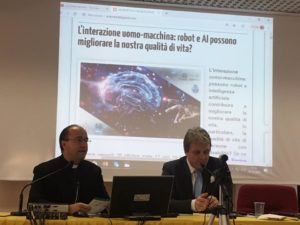 Dr. Stefano Mazzoleni, lecturer and Coordinator of the Bioengineering Laboratory of Rehabilitation, through his speech titled “Human-machine interaction: can robots and AI help improve our quality of life, particularly the quality of life of people with disability?”, guided the participants through the logic of robotic engineering applied to the user-help, referring especially to patients who face difficulties managing their daily routine due to their physical limits. The concern for these needs pushes biorobotics in the direction of service, which looks for the good man.
Dr. Stefano Mazzoleni, lecturer and Coordinator of the Bioengineering Laboratory of Rehabilitation, through his speech titled “Human-machine interaction: can robots and AI help improve our quality of life, particularly the quality of life of people with disability?”, guided the participants through the logic of robotic engineering applied to the user-help, referring especially to patients who face difficulties managing their daily routine due to their physical limits. The concern for these needs pushes biorobotics in the direction of service, which looks for the good man.
A similar interest in the applications and the ethics of robotics was born recently with the advent of a new engineering oriented to products’ usability, beyond the strictly industrial-mechanical context, to families and citizens’ homes. There is talk of the domestic usage of an entity built to enter into a relationship with the needs of man (an element which has been initially designed almost exclusively to accomplish difficult and complex industrial jobs).
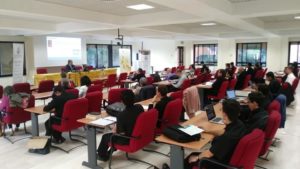 The very origin of the term “robot”, derived from “robota“, refers to heavy work, an index of the nature inherent in the functional-collaborative interaction with human effort, a cooperation that does not (or should not) propose replacement for optimization, namely the efficiency that takes away dignity, but rather should support the thinking subject as the true protagonist. «Observing nature to understand its needs, in the wake of what Leonardo da Vinci has done», educating future engineers in the renaissance model of their profession, so that, seeing trauma or disability, they understand how to take the opportunity to put individual skills at service of others. This fundamental assumption of biorobotics, which has close to its heart the dignity and the good of the person, is absolutely essential; it is indispensable because, without such trajectories, the “ability to make” surrenders to the causes of its birth, namely the “creating know-how” gains the probability of destroying / threatening mankind, a risk that is considered to be therefore acceptable. Cinematography and literature on biorobotics, since the ’80s and decisively surging in the 2000s, suggests new goals. Since 2000, through «bio-inspiration» many capacities not previously explored has taken shape: generation of movement through sensors; wondering why, observing natural and animal bodies to overcome their limits through robotic replication. This progress has led from rigid robotics to neurorobotics and “soft robotics.
The very origin of the term “robot”, derived from “robota“, refers to heavy work, an index of the nature inherent in the functional-collaborative interaction with human effort, a cooperation that does not (or should not) propose replacement for optimization, namely the efficiency that takes away dignity, but rather should support the thinking subject as the true protagonist. «Observing nature to understand its needs, in the wake of what Leonardo da Vinci has done», educating future engineers in the renaissance model of their profession, so that, seeing trauma or disability, they understand how to take the opportunity to put individual skills at service of others. This fundamental assumption of biorobotics, which has close to its heart the dignity and the good of the person, is absolutely essential; it is indispensable because, without such trajectories, the “ability to make” surrenders to the causes of its birth, namely the “creating know-how” gains the probability of destroying / threatening mankind, a risk that is considered to be therefore acceptable. Cinematography and literature on biorobotics, since the ’80s and decisively surging in the 2000s, suggests new goals. Since 2000, through «bio-inspiration» many capacities not previously explored has taken shape: generation of movement through sensors; wondering why, observing natural and animal bodies to overcome their limits through robotic replication. This progress has led from rigid robotics to neurorobotics and “soft robotics.
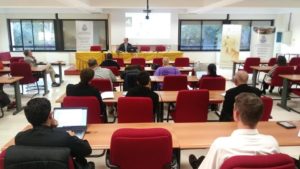 Currently, biorobotics explains the medical implant of organs and artificial limbs where they are absent, bringing in close contact doctors, researchers, scientists, engineers whose work will be a qualitative improvement of the life of patients for whom biorobotics will be an advantage. For example, the robotic hand, whose functioning Dr. Mazzoleni has highlighted, and which could be summarized in the interception of the electric impulse, thanks to the study of nerve signals, referring to the intentionality of moving the robotic hand as the human one usually moves. Biorobotics also promises benefits such as smaller incisions, shorter hospitalization, reduced risk of infection, less pain, faster healing times.
Currently, biorobotics explains the medical implant of organs and artificial limbs where they are absent, bringing in close contact doctors, researchers, scientists, engineers whose work will be a qualitative improvement of the life of patients for whom biorobotics will be an advantage. For example, the robotic hand, whose functioning Dr. Mazzoleni has highlighted, and which could be summarized in the interception of the electric impulse, thanks to the study of nerve signals, referring to the intentionality of moving the robotic hand as the human one usually moves. Biorobotics also promises benefits such as smaller incisions, shorter hospitalization, reduced risk of infection, less pain, faster healing times.
Asimov’s “I, Robot” presents a futuristic dystopian vision of distant worlds in which the natural and artificial cohabit a single body, a single identity or dimension. Such works move the collective imagination between nightmare and dream, fear and hope. On the one hand, the expert responds by releasing us from the anxieties related to robot’s autonomy, the exit from the calculated control, the serenity that derives from the construction of a humanoid machine, which can act (according to the dictates of the human) but it is not able to want since they learn what their creator wants to let them know.
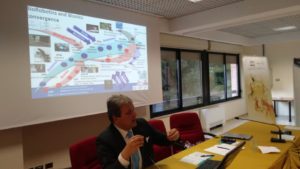 Considering the robot as a tool does not scare, but to think of it as similar to the human species does frighten. Prof. Mazzoleni spoke of the “Uncanny valley“, a perturbing valley, a “sudden fall” in that place where we lose the serene familiarity with objects which have a human appearance. The technical aspects and scientific disciplines treated so far have noted the positive contributions of the relationship between man and machine, but they do not remove that feeling of extraneousness and uncertainty. In this context, bioethics is called to take a buffer function thanks to the critical and rational reflection that the dialogue between research fields, near or far, can build when the object is a subject, i.e. the human being. It encourages the beneficial contribution that robotics, together with artificial intelligence, are making and are destined to cultivate. Preventive ethical vigilance should not degenerate into the trivialization of itself. Instead it is necessary to consider the hypothesis that not all philosophical-scientific movements have close to heart the integral good of the human being, so acting according to the measure of the productive, empowering or efficient advantage, even if this should force us to consider the human being as an entity not dissimilar to what everyone wants to find in his own nature, which is as a bastion of innovation. Conversing about the irreplaceable nature of the human presence in collaboration with technology is the proactive strategy implemented by this first, very rich, appointment, whose spirit resides exactly in living what we know, together with what remains ahead.
Considering the robot as a tool does not scare, but to think of it as similar to the human species does frighten. Prof. Mazzoleni spoke of the “Uncanny valley“, a perturbing valley, a “sudden fall” in that place where we lose the serene familiarity with objects which have a human appearance. The technical aspects and scientific disciplines treated so far have noted the positive contributions of the relationship between man and machine, but they do not remove that feeling of extraneousness and uncertainty. In this context, bioethics is called to take a buffer function thanks to the critical and rational reflection that the dialogue between research fields, near or far, can build when the object is a subject, i.e. the human being. It encourages the beneficial contribution that robotics, together with artificial intelligence, are making and are destined to cultivate. Preventive ethical vigilance should not degenerate into the trivialization of itself. Instead it is necessary to consider the hypothesis that not all philosophical-scientific movements have close to heart the integral good of the human being, so acting according to the measure of the productive, empowering or efficient advantage, even if this should force us to consider the human being as an entity not dissimilar to what everyone wants to find in his own nature, which is as a bastion of innovation. Conversing about the irreplaceable nature of the human presence in collaboration with technology is the proactive strategy implemented by this first, very rich, appointment, whose spirit resides exactly in living what we know, together with what remains ahead.

 Dr. Stefano Mazzoleni, lecturer and Coordinator of the Bioengineering Laboratory of Rehabilitation, through his speech titled “Human-machine interaction: can robots and AI help improve our quality of life, particularly the quality of life of people with disability?”, guided the participants through the logic of robotic engineering applied to the user-help, referring especially to patients who face difficulties managing their daily routine due to their physical limits. The concern for these needs pushes biorobotics in the direction of service, which looks for the good man.
Dr. Stefano Mazzoleni, lecturer and Coordinator of the Bioengineering Laboratory of Rehabilitation, through his speech titled “Human-machine interaction: can robots and AI help improve our quality of life, particularly the quality of life of people with disability?”, guided the participants through the logic of robotic engineering applied to the user-help, referring especially to patients who face difficulties managing their daily routine due to their physical limits. The concern for these needs pushes biorobotics in the direction of service, which looks for the good man. The very origin of the term “robot”, derived from “robota“, refers to heavy work, an index of the nature inherent in the functional-collaborative interaction with human effort, a cooperation that does not (or should not) propose replacement for optimization, namely the efficiency that takes away dignity, but rather should support the thinking subject as the true protagonist. «Observing nature to understand its needs, in the wake of what Leonardo da Vinci has done», educating future engineers in the renaissance model of their profession, so that, seeing trauma or disability, they understand how to take the opportunity to put individual skills at service of others. This fundamental assumption of biorobotics, which has close to its heart the dignity and the good of the person, is absolutely essential; it is indispensable because, without such trajectories, the “ability to make” surrenders to the causes of its birth, namely the “creating know-how” gains the probability of destroying / threatening mankind, a risk that is considered to be therefore acceptable. Cinematography and literature on biorobotics, since the ’80s and decisively surging in the 2000s, suggests new goals. Since 2000, through «bio-inspiration» many capacities not previously explored has taken shape: generation of movement through sensors; wondering why, observing natural and animal bodies to overcome their limits through robotic replication. This progress has led from rigid robotics to neurorobotics and “soft robotics.
The very origin of the term “robot”, derived from “robota“, refers to heavy work, an index of the nature inherent in the functional-collaborative interaction with human effort, a cooperation that does not (or should not) propose replacement for optimization, namely the efficiency that takes away dignity, but rather should support the thinking subject as the true protagonist. «Observing nature to understand its needs, in the wake of what Leonardo da Vinci has done», educating future engineers in the renaissance model of their profession, so that, seeing trauma or disability, they understand how to take the opportunity to put individual skills at service of others. This fundamental assumption of biorobotics, which has close to its heart the dignity and the good of the person, is absolutely essential; it is indispensable because, without such trajectories, the “ability to make” surrenders to the causes of its birth, namely the “creating know-how” gains the probability of destroying / threatening mankind, a risk that is considered to be therefore acceptable. Cinematography and literature on biorobotics, since the ’80s and decisively surging in the 2000s, suggests new goals. Since 2000, through «bio-inspiration» many capacities not previously explored has taken shape: generation of movement through sensors; wondering why, observing natural and animal bodies to overcome their limits through robotic replication. This progress has led from rigid robotics to neurorobotics and “soft robotics. Currently, biorobotics explains the medical implant of organs and artificial limbs where they are absent, bringing in close contact doctors, researchers, scientists, engineers whose work will be a qualitative improvement of the life of patients for whom biorobotics will be an advantage. For example, the robotic hand, whose functioning Dr. Mazzoleni has highlighted, and which could be summarized in the interception of the electric impulse, thanks to the study of nerve signals, referring to the intentionality of moving the robotic hand as the human one usually moves. Biorobotics also promises benefits such as smaller incisions, shorter hospitalization, reduced risk of infection, less pain, faster healing times.
Currently, biorobotics explains the medical implant of organs and artificial limbs where they are absent, bringing in close contact doctors, researchers, scientists, engineers whose work will be a qualitative improvement of the life of patients for whom biorobotics will be an advantage. For example, the robotic hand, whose functioning Dr. Mazzoleni has highlighted, and which could be summarized in the interception of the electric impulse, thanks to the study of nerve signals, referring to the intentionality of moving the robotic hand as the human one usually moves. Biorobotics also promises benefits such as smaller incisions, shorter hospitalization, reduced risk of infection, less pain, faster healing times. Considering the robot as a tool does not scare, but to think of it as similar to the human species does frighten. Prof. Mazzoleni spoke of the “Uncanny valley“, a perturbing valley, a “sudden fall” in that place where we lose the serene familiarity with objects which have a human appearance. The technical aspects and scientific disciplines treated so far have noted the positive contributions of the relationship between man and machine, but they do not remove that feeling of extraneousness and uncertainty. In this context, bioethics is called to take a buffer function thanks to the critical and rational reflection that the dialogue between research fields, near or far, can build when the object is a subject, i.e. the human being. It encourages the beneficial contribution that robotics, together with artificial intelligence, are making and are destined to cultivate. Preventive ethical vigilance should not degenerate into the trivialization of itself. Instead it is necessary to consider the hypothesis that not all philosophical-scientific movements have close to heart the integral good of the human being, so acting according to the measure of the productive, empowering or efficient advantage, even if this should force us to consider the human being as an entity not dissimilar to what everyone wants to find in his own nature, which is as a bastion of innovation. Conversing about the irreplaceable nature of the human presence in collaboration with technology is the proactive strategy implemented by this first, very rich, appointment, whose spirit resides exactly in living what we know, together with what remains ahead.
Considering the robot as a tool does not scare, but to think of it as similar to the human species does frighten. Prof. Mazzoleni spoke of the “Uncanny valley“, a perturbing valley, a “sudden fall” in that place where we lose the serene familiarity with objects which have a human appearance. The technical aspects and scientific disciplines treated so far have noted the positive contributions of the relationship between man and machine, but they do not remove that feeling of extraneousness and uncertainty. In this context, bioethics is called to take a buffer function thanks to the critical and rational reflection that the dialogue between research fields, near or far, can build when the object is a subject, i.e. the human being. It encourages the beneficial contribution that robotics, together with artificial intelligence, are making and are destined to cultivate. Preventive ethical vigilance should not degenerate into the trivialization of itself. Instead it is necessary to consider the hypothesis that not all philosophical-scientific movements have close to heart the integral good of the human being, so acting according to the measure of the productive, empowering or efficient advantage, even if this should force us to consider the human being as an entity not dissimilar to what everyone wants to find in his own nature, which is as a bastion of innovation. Conversing about the irreplaceable nature of the human presence in collaboration with technology is the proactive strategy implemented by this first, very rich, appointment, whose spirit resides exactly in living what we know, together with what remains ahead.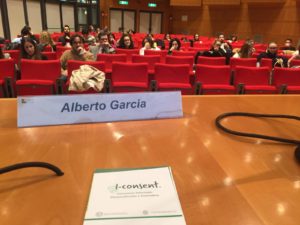
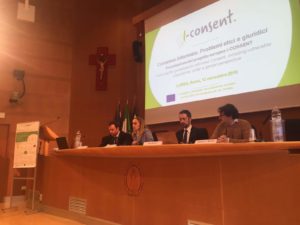 He also approached the tensions that arise from a conceptualization of IC that depends on a notion of individual autonomy that is not shared by all cultures and religions: while western culture tends to give importance to the individual and his or her rights, eastern traditions use to put more weight on community and the duties that derive from it. Thinking about how each major religious tradition (namely Buddhism, Confucianism, Christianity, Judaism, Hinduism and Islam) views IC in accordance to their doctrine and traditions will help to outline defined goals for the effectiveness of i-CONSENT.
He also approached the tensions that arise from a conceptualization of IC that depends on a notion of individual autonomy that is not shared by all cultures and religions: while western culture tends to give importance to the individual and his or her rights, eastern traditions use to put more weight on community and the duties that derive from it. Thinking about how each major religious tradition (namely Buddhism, Confucianism, Christianity, Judaism, Hinduism and Islam) views IC in accordance to their doctrine and traditions will help to outline defined goals for the effectiveness of i-CONSENT.